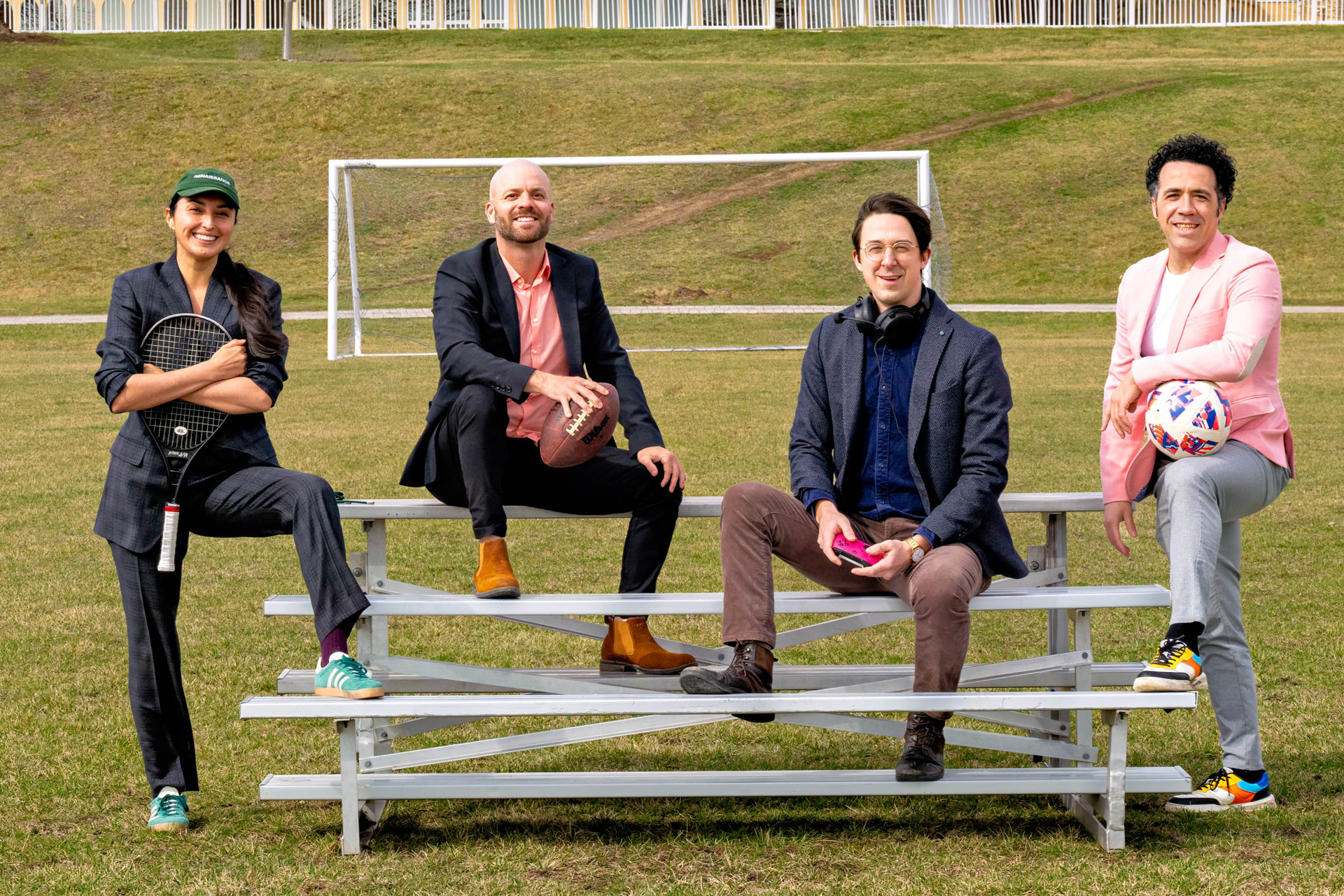
MIU moves into intercollegiate athletics, launches Consciousness-Based Sports
Starting with a soccer team last fall, a tennis team this spring, and more teams this fall, MIU is expanding into intercollegiate sports — a move that has already begun to boost student enrollment, increase donations, and energize school spirit.

At the same time MIU is pioneering a new paradigm in sports training — Consciousness-Based sports.
MIU has had sports teams for short stretches in earlier eras, including basketball, soccer, and tennis. But this year it’s big time.
The dream began fifteen years ago with three MIU undergraduate students, all athletes — Rubén Sanchez, Luke Jaicks, and Owen Blake. Passionate about both sports and Consciousness-Based education, they recognized the potential of athletics for expanding the university along with the potential of MIU’s educational approach for transforming athletics.
Last year they reunited to make that dream a reality, adding fellow alum Percilla Herrera to the team.
MIU is preparing to join the National Association of Intercollegiate Athletics (NAIA), with its 237 member institutions across the country and more than 83,000 participating student athletes.
MIU hopes to join the Heartland of America Athletic Conference (HAAC) — “the Heart,” as it’s called — with its thirteen member colleges and universities in four states, Iowa, Missouri, Kansas, and Nebraska.
To join the NAIA, MIU must field at least three teams in both women’s and men’s sports. This fall they will add women’s tennis, women’s soccer, and women’s flag football, a rapidly growing sport debuting in the 2028 Summer Olympics in Los Angeles. They will also add an esports team, though it won’t count toward the NAIA’s required six.
MIU has already recruited student athletes. There are now 42 student athletes on campus, Including athletes who had already been enrolled when the sports programs started, with further recruiting actively under way.
“We’re so grateful for all the support we have received,” Rubén says. “From President Nader, from the Board of Trustees, from CEO Bill Smith and the university leadership, from donors. We’re committed to making this a big success, and this support means everything to us.”
“We’re particularly proud of how much our sports program is aligned with MIU’s mission and values.”
— Owen Blake
“We’re particularly proud of how much our sports program is aligned with MIU’s mission and values,” Owen says. “It’s been really amazing to see Maharishi’s knowledge in action. We see that every day with our athletes on the field and courts. It’s really fulfilling when a student comes up to us and says, ‘Oh man, that was the best game I’ve ever played,’ or ‘That was the most fun I’ve ever had,’ or ‘That’s the most fulfilled I’ve ever been on the court.’ To us that’s been really, really powerful.”
This experience of being “in the zone” spearheads their recruiting strategy. “We’re bringing students here who want to be part of this culture, of this vision, and really develop themselves internally and on the court,” Owen says. “That’s the first thing we pitch when we go out recruiting.”
Growth potential
Of all the graduating high school athletes who want to play at the college level, less than ten percent are able to land a spot on a roster — so there is clear demand.
“Many will be attracted to MIU and our approach,” Luke says. “We’ll also develop agreements with local community colleges where our teams compete, so that their graduating student athletes can enroll at MIU, earn their bachelor’s degrees, and continue playing their sport.”
NAIA data shows that each new team a school adds typically brings in 25–40 athletes, which can translate to a 5–10% enrollment bump for smaller schools. NAIA studies also show higher retention for athletes — 75–80% first-to-second-year retention vs. 65–70% for non-athletes.
But those numbers are by no means limits.
Luke Jaicks coached football at several other colleges before coming to MIU, including Brevard College in North Carolina, where he helped start a football team from scratch. “I started at Brevard in 2017,” he says. “We brought in non-scholarship students, our locker room was in the old movie theater, and we played at the local high school. The team went from zero to 52 students in the first year. When I left five years later, we had 242 students, with multiple junior varsity teams along with the varsity team.”
“We have tremendous opportunities for growth here at MIU.”
— Luke Jaicks
Nearby William Penn University offers a case study. Located in Oskaloosa, a town about the same size as Fairfield, the school decided to invest in athletics ten years ago. Today, of the 1,100 students on campus, 700 are student athletes, with close to 75 students on the men’s soccer team alone.
“We have have tremendous opportunities for growth here at MIU,” Luke says.
Consciousness-Based Sports – training the “zone muscle”
Beyond launching sports teams, MIU is introducing Consciousness-Based Sports, a paradigm-shifting approach to sports training.
“I’ve been in this field my whole life, and I’ve never seen anyone get to the level we have with Conscious-Based Sports,” Luke says. “There’s performance training, there’s sports psychology, but no one trains the ‘zone muscle.’ That’s the mythical unicorn in the sports world. Nobody knows how to get to it. But we have the tools and the technology to train that zone muscle.”
They plan a whole curriculum around Consciousness-Based Sports.
“Students will be able to graduate as Consciousness-Based Sports-certified performance coaches, filling a growing demand and spreading MIU’s core knowledge.”
— Owen Blake
“The curriculum we’re developing will prepare students for careers in sports psychology, coaching, sports management, leadership, and wellness, emphasizing holistic growth,” Owen says. “We’ll start next year with a specialization in Consciousness-Based Sports and build to degree programs, both on campus and online. Students will be able to graduate as Consciousness-Based Sports-certified performance coaches, filling a growing demand and spreading MIU’s core knowledge. Our master’s degree programs in CBS will attract coaches and other athletic professionals who want to expand their knowledge.”
Luke points out a parallel between MIU and the University of Nebraska.
In 1969, Nebraska’s athletic director hired a specialist in something called “strength training” to work with the football team. The move was initially met with skepticism. But Nebraska won the national championship the next two years and since then has won more games by far than any other team in the country. And strength training has become an essential component in athletic programs around the world.
“We’re doing the same thing with the zone, the flow state,” Luke says. “Everyone has heard about it, but no one understands what it is or how to train for it. With Consciousness-Based Sports, we can train people to have that experience, achieve better performance, develop themselves into to better human beings. That’s our goal — to help enlighten individuals through sports and help the world.”
Meet the leadership team
Rubén Sanchez
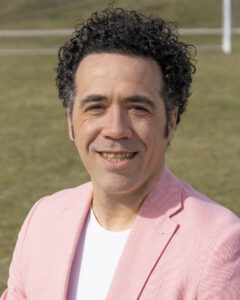
Rubén played professional soccer in Barcelona, Spain, for six years before coming to MIU in 2009.
“I was doing what I thought I loved most, but I was suffering,” he says. “Things were not connecting. I wanted to find answers. I wanted to find the truth about myself, about happiness, about performance, about what I could contribute and how I could actually fulfill my dream.”
Then he read about MIU.
“I said, this is it — I’m going to this place. I quit my two-year contract, I sold my car, my house, everything. I knew this place had something I wanted.”
He arrived at MIU “speaking no English,” he says. “I learned Transcendental Meditation, and I decided this what I wanted to do the rest of my life. I saw that this could transform athletics and the whole sports industry.”
He took a long break midway through his studies. He spent a year in New York City working for the David Lynch Foundation in a Quiet Time school project. Then he returned to Spain for two more years of professional soccer. “The other players had fun calling me ‘the philosopher’ when they saw me meditating in the bus,” Rubén says. His team won the championship the second season. And in 2013 he went to the Netherlands to take the TM Teacher Training course.
In 2015 he completed his BA in Maharishi Vedic Science, then returned in 2019 for an MA in Consciousness and Human Potential.
After graduating in 2015, he launched StressFreeSports, offering a Consciousness-Based sports methodology through which he has been helping athletes, coaches, sports directors, and leaders in different sports and at different levels, including Olympians and world champions worldwide.
“You’ll see at the end of the season.”
— Rubén Sanchez
He was hired by the Bali United professional soccer team in the Indonesian League, where he taught the TM technique to the coach and all the players. The owner of the team, a Chinese billionaire, asked Rubén how this could help them win the league championship — which they had never done. “You’ll see at the end of the season,” Rubén told him. And that’s exactly what they did, winning championships in 2019–2020 and again in 2021–2022. Rubén then began working with Persib United, another Indonesian professional soccer team. They won the league championship in 2023–24.
Branching out from soccer, Rubén was hired to work with the Spanish Olympic synchronized swimming team. They went on to win gold medals at the European Games, the Synchronized Swimming World Cup, the world championships, and a bronze medal at the Paris Summer Olympic Games in 2024.
Next came the Spanish rowing team, which Rubén helped to win two silver medals at the 2022 World Rowing Championships — a feat no Spanish rowing team had ever achieved.
Luke Jaicks
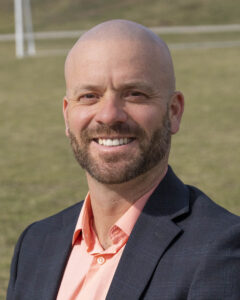
When Luke Jaicks arrived at MIU in 2010, he was coming for a second degree. He had earned a degree in psychology from Southern Utah University, where he played Division I football. In high school, he was an all-state defensive back his senior year, ranked number two in the state out of more than 12,000 players in that position.
“I played sports my whole life,” Luke says. “I used to have that zone experience, but I couldn’t explain it. It was so amazing, so silent and joyful. But I didn’t know what it was, and I was really looking for that. I started to get into yoga and meditation. I remember wishing there was a school that did meditation, and a friend told me, ‘There is.'”
He attended a Visitors Weekend at MIU. “When I returned home, I told my family that I was going to Fairfield, Iowa, to Maharishi International University to learn meditation. They had no background in any of this — they thought it was crazy. It was the best thing that ever happened to me.”
This is where he met Owen and Rubén. “We were the sports guys,” he says. “We connected.”
He graduated in 2013 with a degree in Maharishi Vedic Science.
From there he went on to a successful career as a football coach and recruiter at six colleges around the country, ranging from large to small — Arizona State, Scottsdale Community College, Southwest Oklahoma State (where he also earned a master’s in sports management), Brevard College (North Carolina), Clemson University, and Missouri Valley College.
“It’s funny, because all my players would see me meditating in the bus, and they’d ask what I was doing,” Luke says. “I told all my athletes that MIU and TM was the greatest thing that ever happened to me, and that if I had $100,000 I would have spent it all on learning TM.”
“I told all my athletes that MIU and TM was the greatest thing that ever happened to me, and that if I had $100,000 I would have spent it all on learning TM.”
— Luke Jaicks
In 2019, as the defensive coordinator at Brevard, Luke shattered the 76-year-old USA South Conference record for “total defense.” His defense allowed just 10.3 points per game (the NCAA average: 26.0), allowed zero touchdowns in five of ten games, and posted four straight shutouts. With this exceptional performance, Luke’s defense ranked #1 across all NCAA divisions out of 524 schools. His defenses continued their dominance over the next two seasons, with national rankings of #4 and #8.
“I truly believe MIU is the best school in the world,” Luke says. “It’s just amazing what this community and university have done for me and my life, which I can never repay. I’m just so grateful to be here. We want to bring more people here and teach them this.”
Owen Blake
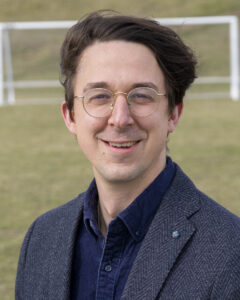
Owen was born and raised in Fairfield and went to Maharishi School. “I dropped out in the first grade — I always have to say that,” he says. After six years of homeschooling, he returned in eighth grade.
When he graduated, he enrolled at MIU, where he earned a BA in Media and Communications. After working in the MIU Admissions Office for a year, he attended the TM Teacher Training course.
While Rubén was introducing TM to athletes, Owen taught TM in San Diego for a year, then spent a year with the David Lynch Foundation teaching TM in a school’s Quiet Time program while also coaching their middle school basketball team. He returned to MIU for a master’s in Maharishi Vedic Science, then taught at Maharishi School for a year.
Then he enrolled in the PhD program in Maharishi Vedic Science. “I knew I wanted to research the effectiveness of Transcendental Meditation practice for esport athletes,” Owen says. “I’ve always been interested in sports and competition and the idea of improving yourself and being the best version of yourself that you can be. I’ve also always been interested in gaming and video games.”
He remembers speaking with Rubén when they were students together and Rubén talking about bringing TM to athletes. “At the same time, I was thinking it would be really cool to bring TM to the video game athlete community — to esports, where electronic sports video games are played professionally, a pretty wild concept. Esports are booming today, but then it was a brand new industry, the wild west of training.”
“I thought the esports industry was ripe for Maharishi’s knowledge and that we could revolutionize the industry with more holistic and healthy training styles.”
— Owen Blake
“In traditional sports, your body gives you obvious physical feedback about how much training you can do before your body needs to rest and recover,” Owen says. “But with more mental sports like esports, the mind can push further than the body, and mental fatigue is not so obvious to most people. So I thought the esports industry was ripe for Maharishi’s knowledge and that we could revolutionize the industry with more holistic and healthy training styles.”
As a PhD student, Owen cold-called his way to an invitation to work with an esports team, Misfits Gaming, located in Berlin, the center of European esports. “As soon as I was called about the position,” Owen says, “I knew I had to bring Rubén in.” They spent the next year as researchers, teaching TM to the team’s athletes and studying the outcomes.
“We looked at burnout and performance,” he says. “You wouldn’t think burnout would be a big thing in esports — players are just sitting around playing video games all day, right? But esports athletes retire at age 25, on average, due to burnout and physical strain.”
To measure the results, they used two instruments, the Perceived Stress Scale and the Athlete Burnout Questionnaire, which measured qualitative changes in the players’ lives.
“We found that players grew in emotional resiliency during the season,” Owen says. “They reported improved relationships, improved communication, the ability to remain steady in tough situations, greater emotional balance, and greater open-mindedness.”
Both inventories showed that the group that stayed with their TM practice had either reductions in burnout or no change during the season, while the group that did not continue increased in burnout. They replicated the study the following season.
Misfits Gaming hired both Owen and Rubén as performance coaches. Besides teaching Transcendental Meditation, they worked with the players on physical exercises, goal setting, teamwork, and personal relationships. Misfits Gaming rose from near the bottom of the league to the top quartile, and in the European playoffs, they came within one play of qualifying for the equivalent of the esports world cup.
From Berlin, Owen returned to MIU, where he completed his PhD and is now a full-time professor in the Maharishi Vedic Science department as well as Director of Consciousness-Based Sports Curriculum Development and Head of Esports.
Intercollegiate esports is exploding among US colleges and universities. The National Association of Collegiate Esports (NACE) has over 240 member schools and more than 5,000 student competitors. Schools increasingly offer esports scholarships and other financial incentives to attract top gaming talent. Many schools are investing in dedicated esports facilities, including gaming arenas and training centers, to support their teams and enhance the student experience.
“We want MIU to be a lighthouse for the esports industry as a whole.”
— Owen Blake
“We want to fully integrate our esports operations with the rest of our athletic program,” Owen says. “Our athletes will train at all four levels — physically, mentally, emotionally, and spiritually. We want to leverage our inner development to create as much outer success and performance as we can. We have a competitive edge, but we also have something really powerful for all esport athletes. We want MIU to be a lighthouse for the esports industry as a whole.”
Percilla Herrera
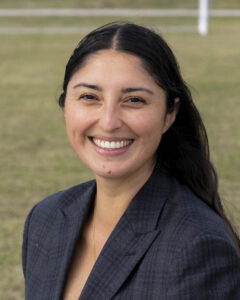
Percilla serves as Sports Information & Creative Director. “I’m responsible for our brand, image, marketing, materials, uniforms, swag,” she says. “I get to bring my passion for all things aesthetic, sports, and transcendence together. It’s really a dream job.”
She started playing soccer at the age of eight — “begrudgingly,” as she recalls, at her father’s insistence. It took a few practice sessions, but “I started to like it,” she says. “I went on to play club soccer, was the captain of my high school’s varsity soccer team as a freshman, played soccer in college, and coached girls junior varsity and boys varsity soccer.”
She attended MIU from 2013–2015, where she did an individualized major in Women, Consciousness, and Health.
A Transcendental Meditation teacher since 2017, Percilla has taught in New York City, Los Angeles, Arizona, and India, instructing more than 2,000 people. She has worked for the David Lynch Foundation, Maharishi Foundation USA, Maharishi Foundation International, and Maharishi School. At Maharishi School she was Director of Consciousness, where she was responsible for all TM-related activities — teaching, checking, leading daily group meditations, and TM Retreats. She also coached the boy’s soccer team.
“Last summer I ran into Rubén at a conference at Meru, in the Netherlands, and I mentioned that I had come with confusion about where my career would go after becoming a mom,” Percilla says. “I said that being at MERU calmed my anxiety about it and allowed me to surrender to nature. A couple weeks later Rubén asked me to work on this initiative.”
“Aside from birthing a baby, there isn’t anywhere else I’ve experienced the combination of silence and dynamism as on a playing field.”
— Percilla Herrera
“I love the strength and honor culture of sports, the grit that pumps through an athlete’s heart, and I’m excited to infuse our department with the essence of Consciousness-Based Sports,” she says. “The quality of dynamism and silence, chaos and order — aside from birthing a baby, there isn’t anywhere else I’ve experienced the combination of silence and dynamism as on a playing field.”
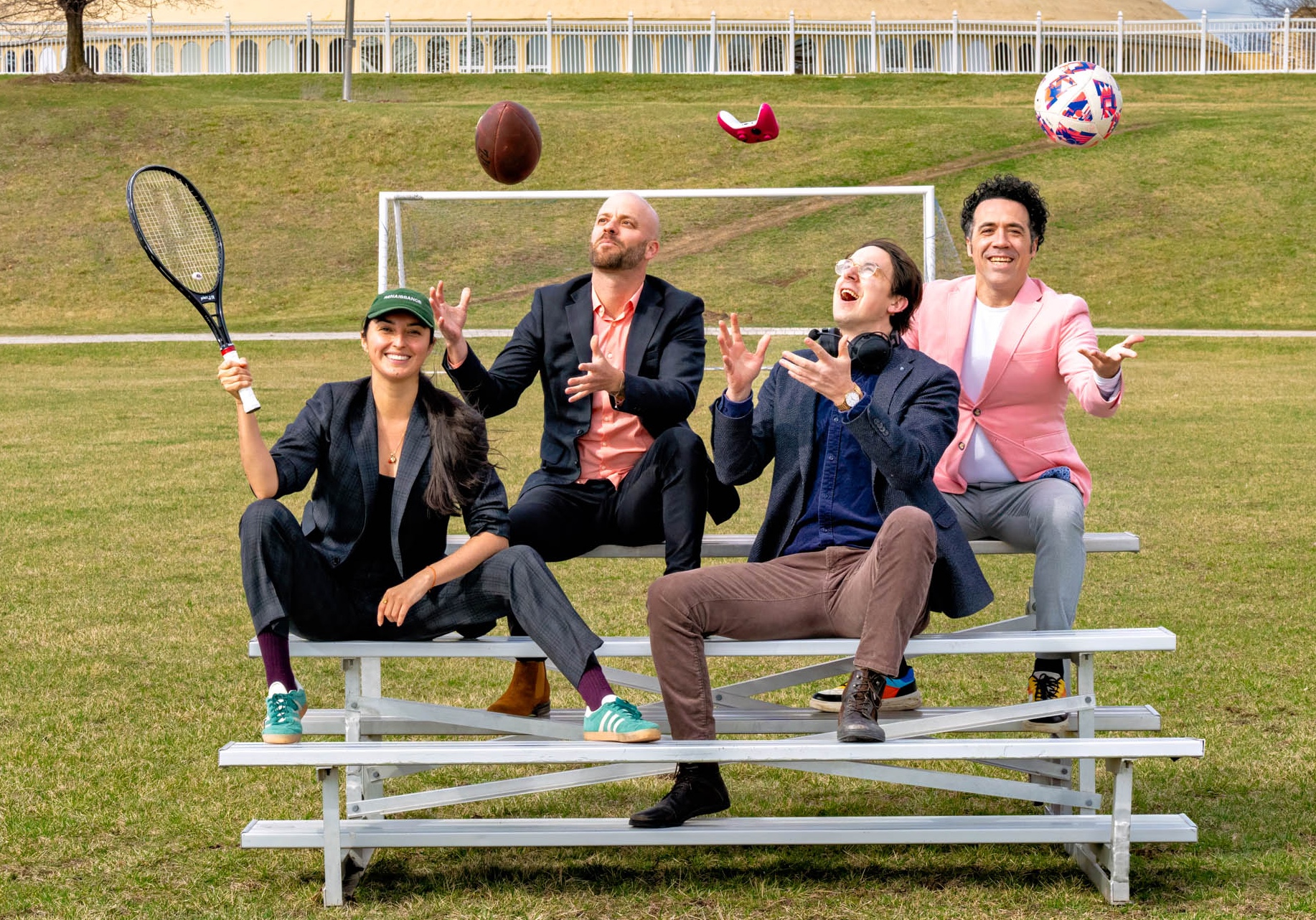
An NAIA team visits MIU
On February 10-11, 2025, representatives from the National Association of Intercollegiate Athletics visited MIU as part of the NAIA Pathways Program, designed to prepare athletic departments for NAIA membership.
The representatives included Nick Davidson, Vice President of Membership, Recruitment, and Retention, and Todd Stutzman, Manager of Membership Sales Operations. They were joined by Nik Rule, commissioner of the Heart of America Conference and Athletics Director at William Penn University.
They reviewed MIU’s athletics department and advised on what MIU needs to do to join the NAIA. The Pathways Program offers ongoing support until MIU is ready to apply for membership, typically in two to three years. MIU joined the NAIA Pathways Program last December.
The team met with President Nader, members of the Board of Trustees, the Athletics Department staff, the Enrollment, Financial Aid, and fundraising teams, and President’s Leadership Team.
“MIU’s philosophy aligns with broader trends in athlete mental health, performance psychology, and holistic development, making the Consciousness-Based Athletics model an asset rather than an outlier. If effectively communicated, this could serve as a distinctive recruiting advantage, positioning Maharishi International University as a leader in mental wellness-focused collegiate athletics, which is an area of growing emphasis across all levels of sports.”
– from the team report
“MIU has strong potential to establish a successful athletics program. The institution’s Consciousness-Based Education model positions it uniquely to pioneer ‘stress-free sports,’ creating an innovative approach to collegiate athletics,” they wrote in their report.
They also visited the MIU Recreation Center and Fieldhouse and appreciated the potential of both buildings. “They were impressed with the high ceilings in the Fieldhouse,” Luke says. “They were like, nobody has these high ceilings.” When the team walked into the Rec Center, one of the team members, looking down to the far end of the 60,000-square-foot facility, said, “Does all this belong to you?”
“As the next sports we offer, the team suggested we consider volleyball, basketball, wrestling, track and field, and cross country,” Owen says. “We’ll have to make a decision based on the facilities we have.”
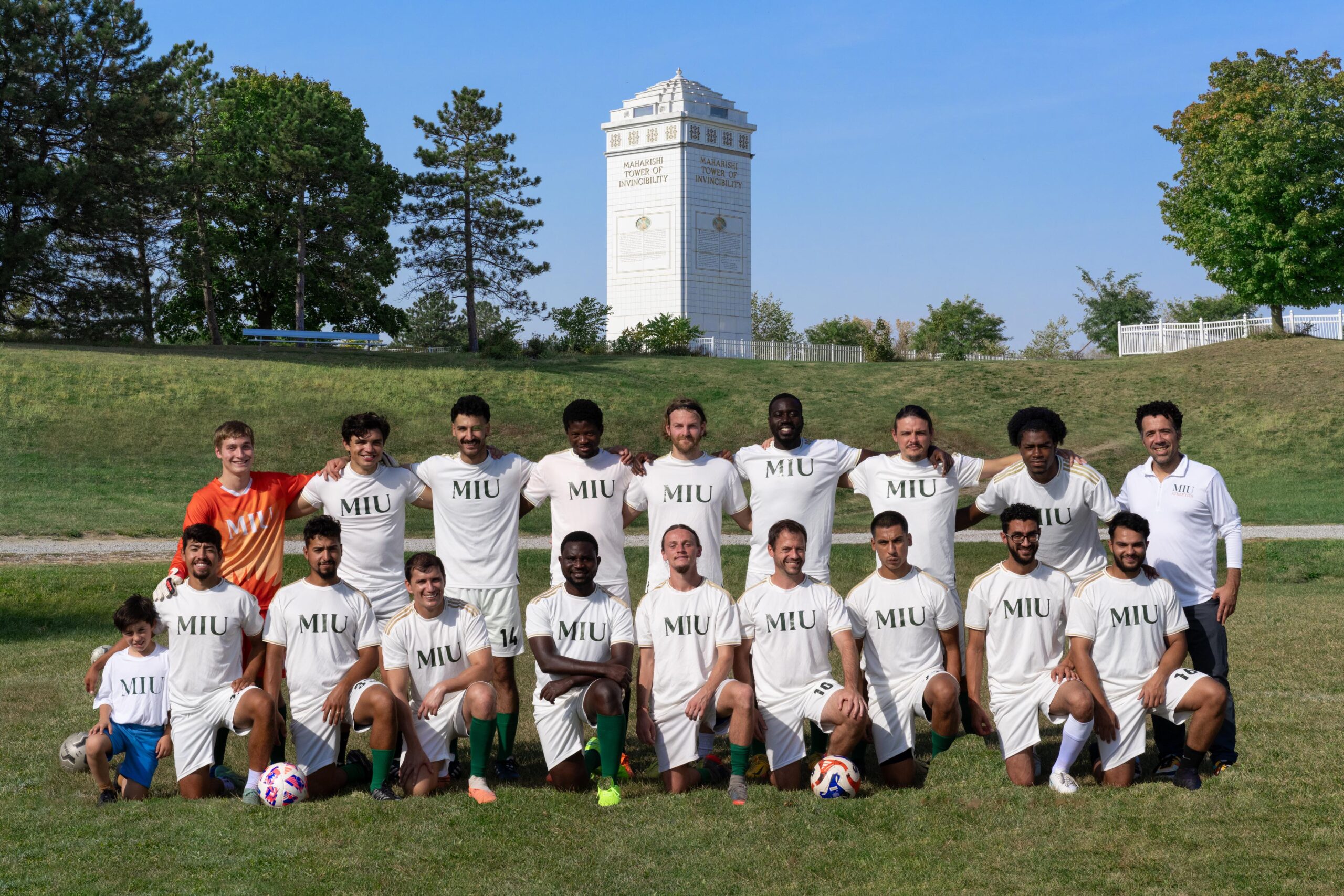
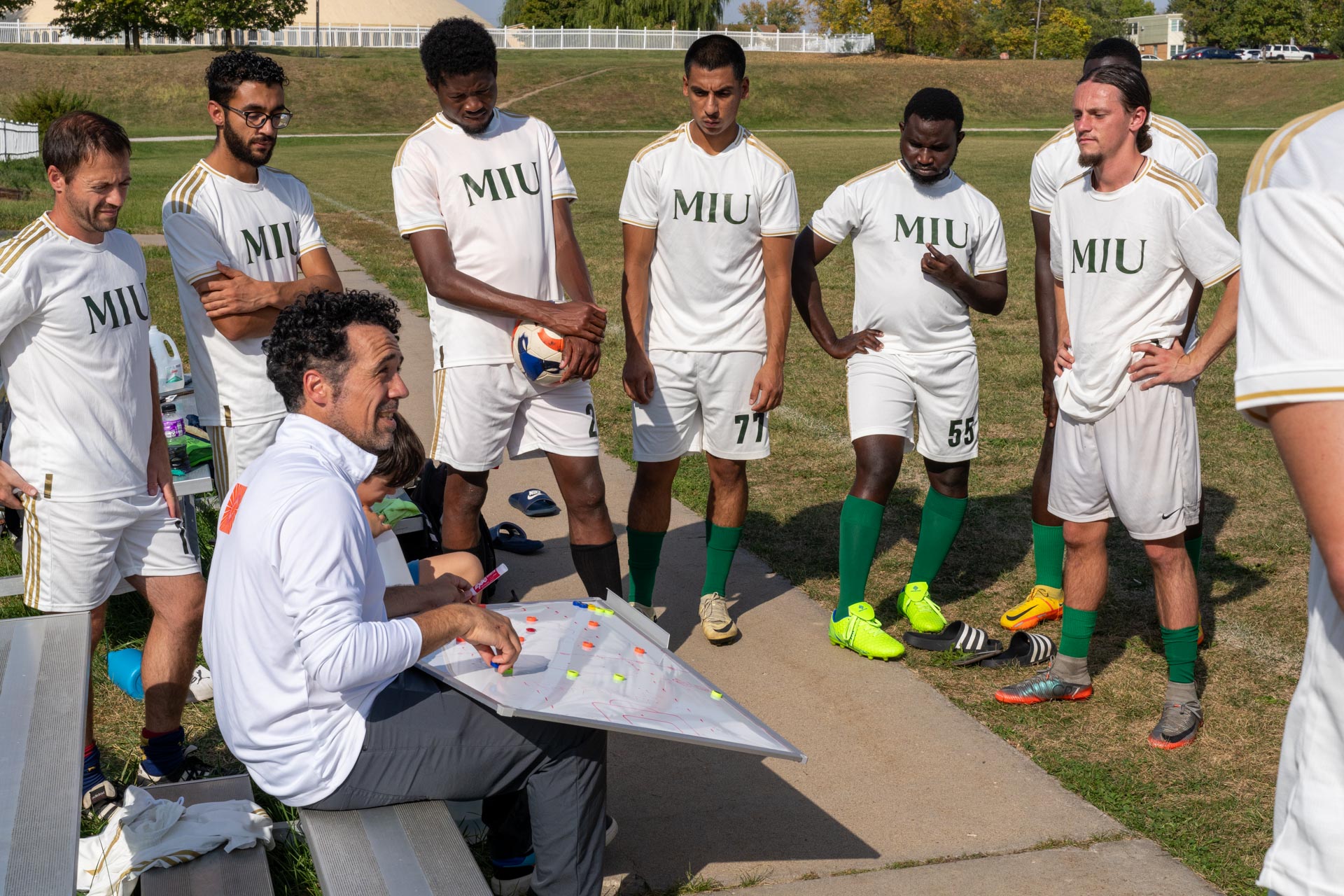
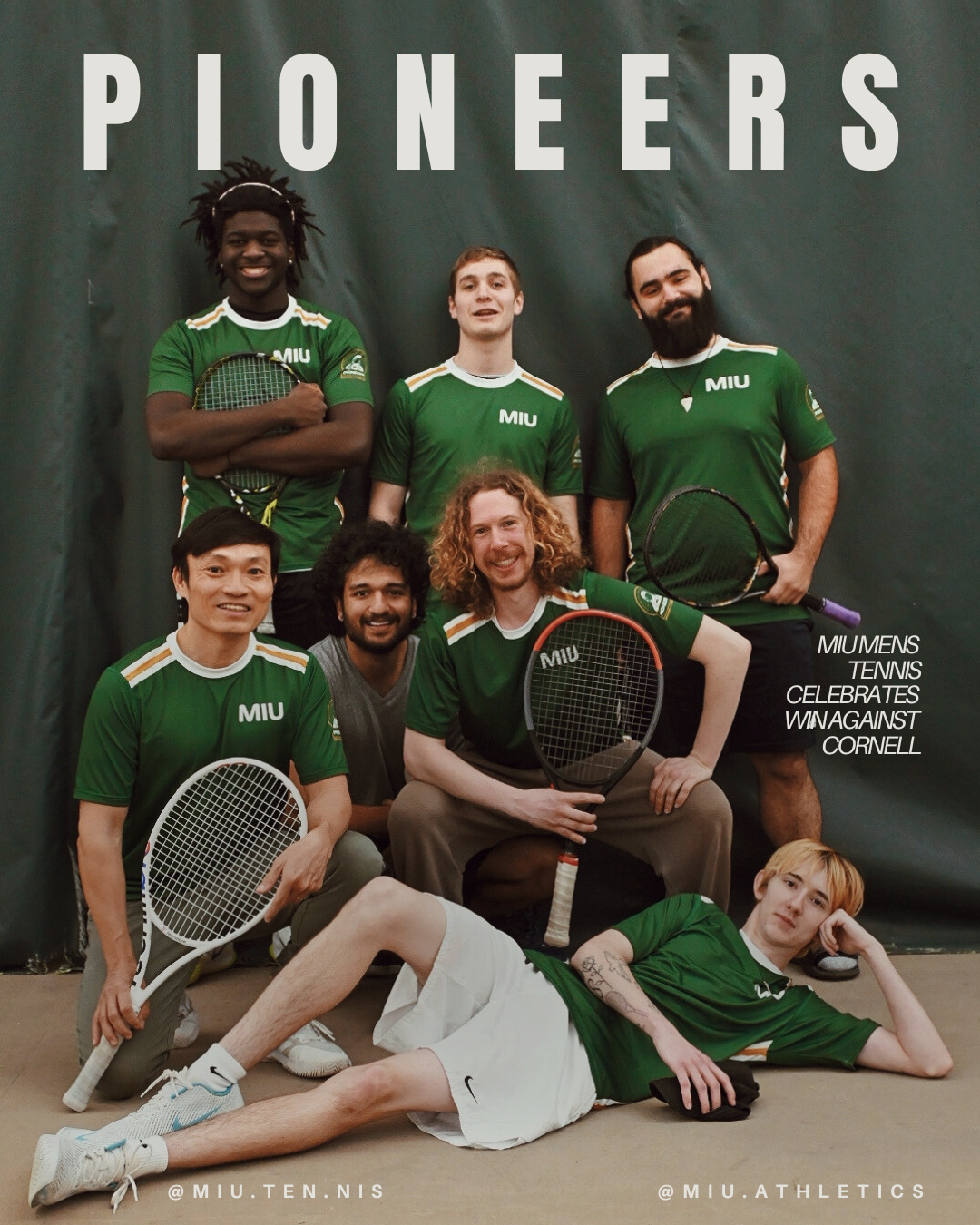
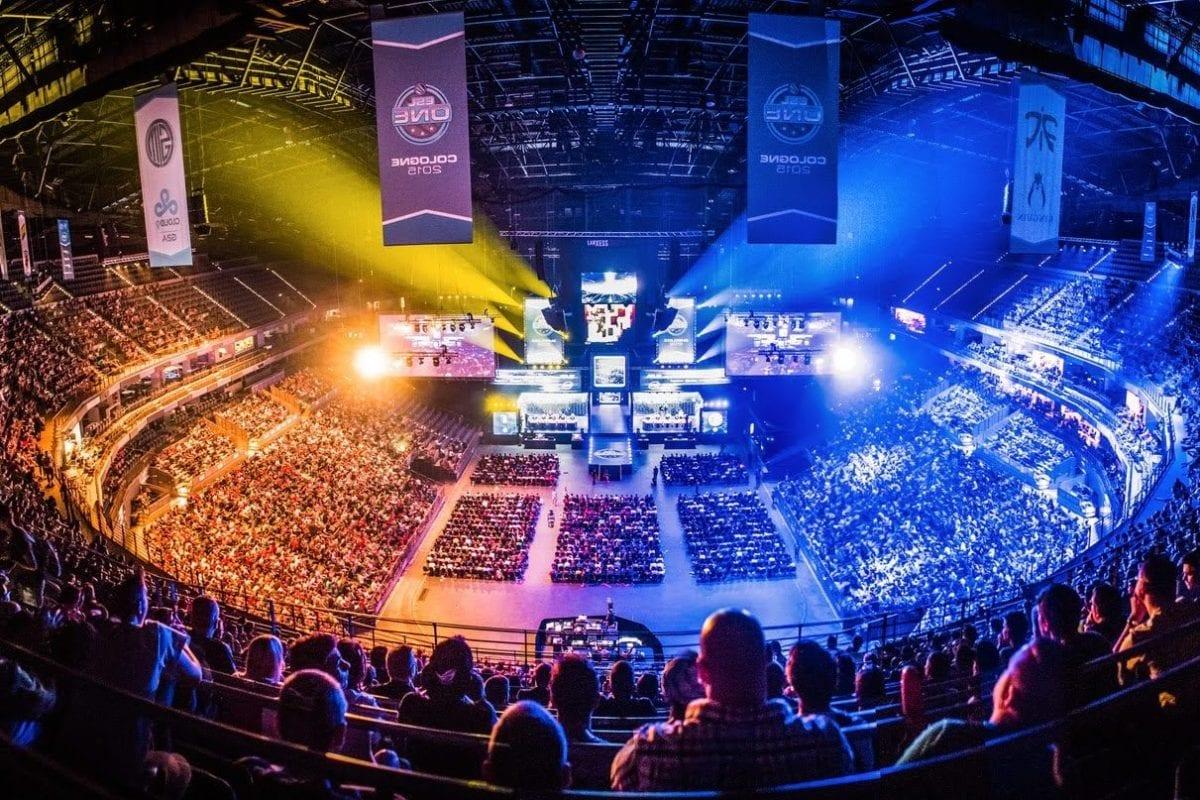
For more information, see MIU Athletics.
Photographs by Ken West. Esports tournament photo from the Memo Middle East Monitor.
